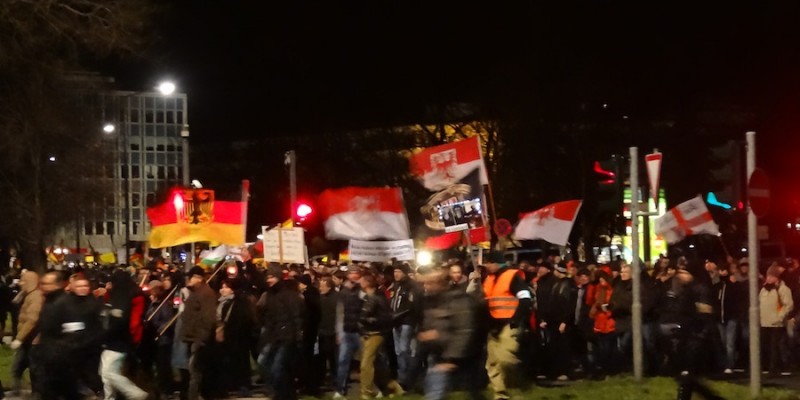1. The anti-Islam rallies flop
The anti-Islam rallies organized by the German far-right movement Pegida, which took place on the 6th of February in various European cities – from Prague to Calais – were ultimately joined only by a few thousands persons. Here is a Reuters video documenting the Dresda protest, where 15,000 persons were expected, but only 8,000 actually showed up.
2. Can Turkey be considered a “safe third-country”?
What is a “safe third-country” and can Turkey be considered as such? In other words: is it admissible to send back migrants from Greece to Turkey, if that is the first country of arrival? According to this accurate and meticolous analysis, the answer is: no, Turkey does not have the requisites to be considered a safe third country and thus migrants cannot be pushed back to Istanbul.
3. Why this Greek granmother and a fisherman deserve a Nobel Peace Prize?
4. The #refugeecrisis, as seen by The Economist
One top-priority: “restore a sense of order to the migration flows”. In a long and detailed analysis – accompanied with some stunning infographics – The Economist argues that chaotic arrivals at the European borders are the main problem that the EU must face in handling the refugee crisis. There is no worse choice than staying still. (Too bad The Economist chose to use the term “illegal migrants”, which is by now out of fashion in good-quality media reporting on the refugee crisis)
5. Yes, we are liberals – but not with Islam
There is one issue that European policies really appear unable to deal with. According to this article by Alexander Betts for Foreign Affairs, islamophobia is indeed the big elephant in the European decision-makers’ room. As long as the debate on the issue remains polarized as it currently is, no solution will be possible. And Betts’ receipt to correct this state of affairs is pretty straight-forward: stop looking at migrants as criminals, ensure freedom of religion and opinion, guarantee the right to asylum. Basically, re-affirming liberal values.
6. “He is not a migrant”
Lui non è un migrante, la foto del giorno commentata da @NiccoloZancan #Controluce https://t.co/MzHm4LkVTG pic.twitter.com/uPaDijktiE
— La Stampa (@la_stampa) February 8, 2016
The Syrian kid with a mattress on his head is a not a migrant, but rather an asylum seeker – according to the Treccani, that is the definition of “a person forced to abandon his home and his country due to war events” .
7. Understanding the divide between Sunnis and Shites through infographics
What is the difference between Sunni and Shiite Muslims? How many of them there are in the world, and where? These info-graphics posted on the European Parliamentary Research Service blog try to explain the the divide between the two major denominations of Islam.
8. Shakespeare in the “Jungle”
The Globe Theatre has brought Shakespeare to the Calais Jungle Globe: in a special event curated by the historical British organization, asylum seekers living in the French unofficial slum have enjoyed a representation of the Hamlet.
9. The role of women in Syria’s peace talks
There is one thing missing in the Syria’s peace talks: women. Recent history – from Liberia to Northern Ireland, from Afghanistan to Rwanda) taught us that better results arrive when women participate in the peace process. This Guardian article by Sabrina Hersi Issa and Liz Drew explains why Syrian women must be involved in bringing peace to the country.
10. Is the EU really going to criminalize volunteers?
Statewatch, a British NGO monitoring human rights and civil liberties, has revealed a classified document by the European Commission which appears to consider criminalization of volunteers saving asylum seekers at sea. Read the whole article on Sputnik News.









